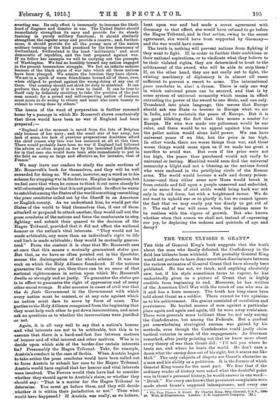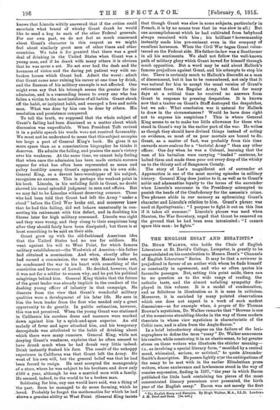THE TRUE ULYSSES S. GRANT.•
THE title of General King's book suggests that the trail about the man who finally defeated the Confederacy in the field has hitherto been withheld. Yet probably General King would not profess to have done more than discriminate between the various estimates of General Grant that have already been published. He has not, we think, said anything absolutely new, but, if his style sometimes turns to vapour, he has undoubtedly given us a picture of Grant that is highly credible from beginning to end. Moreover, he has written of the American Civil War with the touch of one who was in it and has a keen memory. The truth has long since been told about Grant as a soldier. There cannot be two opinions as to hie achievement. His genius consisted of resolution and persistence. He hurled masses of men against a particular place again and again and again, till he wore away resistance. There were generals more brilliant than he, not only among the Confederates, but among the Federals. But a gradual yet overwhelming strategical success was gained by his methods, even though the Confederates could justly claim tactical victories in most of the engagements. As Sherman remarked, after justly pointing out that lie knew more about every theory of war than Grant did : "I'll tell you where he beats me, and where he beats the world. He don't care a damn what the enemy does out of his sight, but it scares me like HelL" The only subjects of dispute are Grant's character as a man and his ability as a politician. It is the former of which General King treats for the most part. We fear that if the ordinary reader of history were asked what the doubtful point was in Grant's personal history, he would answer in one word- " Drink." For every one knows that persistent complaints were made about Grant's supposed intemperance, and every one
• Ms True Ulysses S. Grant. By Charles King, Brig:General, U.S.V., IBS& CO. With al Illustrations. Leaden: J. U. Lippincott Company. US.]
knows that Lincoln wittily answered that if the critics could ascertain what brand of whisky Grant drank be would like to send a keg to each of the other Federal generals. For our own part, we do not feel so much concerned about Grant's character in this respect as we might feel about similarly great men of other times and other countries. We take it for grunted that there was a good deal of drinking in the,- United States when Grant was a young man, and if be drank with many others it is obvious that he was never a sot. No sot ever had the dash and the keenness of vision and the daring yet patient way with un- broken horses which Grant had. Admit the worst : admit that Grant came near ruining his career at one time by drink, and the fineness of his military example is not affected. One might even say that his triumph seems the greater for the admission, and is a resounding lesson to every one who has fallen a victim to the most insidious of all habits. Grant shook off the habit, or incipient habit, and emerged a free and noble man. What was done by him can be done by others. His resolution and persistence conquered.
To tell the truth, we supposed that the whole subject of -Grant's failing had been dismissed as a matter about which discussion was unprofitable. When President Taft revived it in a public speech his words were not received favourably. We must not be understood to mean that this subject occupies too large a part of General King's book. Re gives it no more space than as a conscientious biographer he thinks it deserves. lie admits the failing, and praises the man's victory over his weakness. At the same time, we cannot help feeling that when once the admission has been made certain excuses appear for what has often been represented as mean and paltry hostility among Grant's opponents on his own side. General King, as a devout hero-worshipper of his subject, recognizes no excuses. This is perhaps the weakest point in his book. Lincoln, in his unfailing faith in Grant, no doubt showed his usual splendid judgment in men and affairs. But we may fail to be Lincoln without deserving censure. Those who had been told that Grant had left the Army "under a cloud" before the Civil War broke out, and moreover knew that he bad this failing, did not behave unnaturally in con- necting his retirement with this defect, and in doubting his fitness later for high military command. Lincoln was right and they were wrong, and they clung to their suspicions long after they should fairly have been dissipated; but there is at least something to be said on their aide.
Grant grew up with the old-fashioned American idea that the United States had no use for soldiers. He went against his will to West Point, for which famous military establishment—the Woolwich of America—his father had obtained a nomination. And when, shortly after he had earned a commission, the war with Mexico broke out, he condemned the war in his heart with something of the conviction and fervour of Lowell. He decided, however, that it was not for a soldier to reason why, and Ile put his political misgivings behind him. General King thinks that the future of the great leader was already implicit in the conduct of the dashing young officer of infantry in that campaign. He dissents from the view that Grant's wonderful military qualities were a development of his later life. He Bees in him the born leader from the first who needed only a great opportunity to do greatly. In public estimation, however, this was not perceived. When the young Grant was stationed in California his careless dress and manners were marked down against him by a spick-and-span superior. An old malady of fever and ague attacked him, and his temporary decrepitude was attributed to the habit of drinking about which there were many rumours. General King, while not denying Grant's weakness, explains that he often seemed to have drunk much when he had drunk very little indeed. Drink instantly flashed his face. The result of the unhappy experience in Californa was that Grant left the Army. lie went of his own will, but the general belief was that he bad been forced to resign. He next accepted the managership of a store, where he was subject to his brothers and drew only £160 a year, although he was a married man with a family. He seemed, indeed, to the world to be a broken man.
Soldiering for him, any one would have said, was a thing of 'the past. Soon he managed to do some farming, which he .loved. Probably he forgot the mathematics for which he had shown a genuine ability at West Point, (General King insists
that though Grant was slow in some subjects, particularly in French, it is by no means true that he was slow in all.) Bat one accomplishment which he had cultivated from babyhood always remained with him ; his brilliant*, horeemanship instantly made him pre-eminent even in the company of excellent horsemen. When the Civil War began Grant volun- teered on the Federal side. His father-in-law was a Southerner in all his sentiments. We ahall not follow the well-known path of military glory which Grant hewed for himself through much opposition. But a word may be said about Halleck's famous prejudices against Grant, and his attempts to stop his rise. There is certainly much to Halleck's discredit as a man of discernment, but it has to be remembered, not only that It was natural for him to accept the usual version of Grant's retirement from the Regular Army, but that for many' days at a critical time he received no answers from Grant in response to pressing despatches. It is known now that a traitor on Grant's Staff destroyed the despatches, but we ask : What conclusion was it natural for Halleck to draw in the circumstances P Would he have done right not to express his suspicions ? This is where General King seems to us to make too little allowance for those who stood in Grant's way in the earlier part of the war. He writes as though they should have divined things instead of acting- on evidence, as most of us poor mortals are bound to do.. Grant, as a matter of fact, was probably from this time onwards more zealous for a " teetotal Army " than any other officer. One day when he was a Colonel, learning that the men of his battalion were carrying "loaded" canteens, he halted them and made them pour out every drop of the whisky on to the thirsty soil of Sangamon County.
The story of Lee's magnificent act of surrender at Appomattox is one of the most moving episodes in military history. General King does justice to it, as well as to Grant's noble and adamantine loyalty to the terms of the surrender when Lincoln's successor in the Presidency attempted to punish the heads of the Confederacy for the assassin's crime.. Two phrases abide in our memory as epitomizing Grant's character and Lincoln's relation to him. Grant's phrase war used at Spottsylvania "I purpose to fight it out on this line if it takes all summer." Lincoln's phrase was used when Stanton, the War Secretary, urged that Grant be removed on the ground that he had been seen intoxicated: "I cannot. spare this man: he fights."







































 Previous page
Previous page